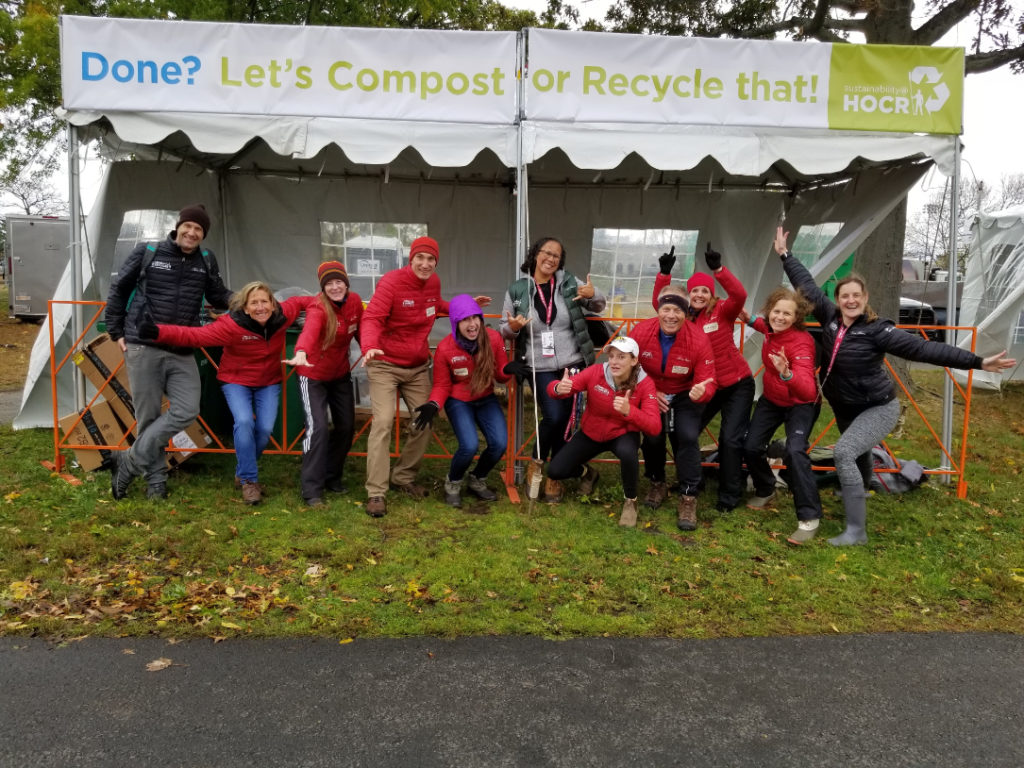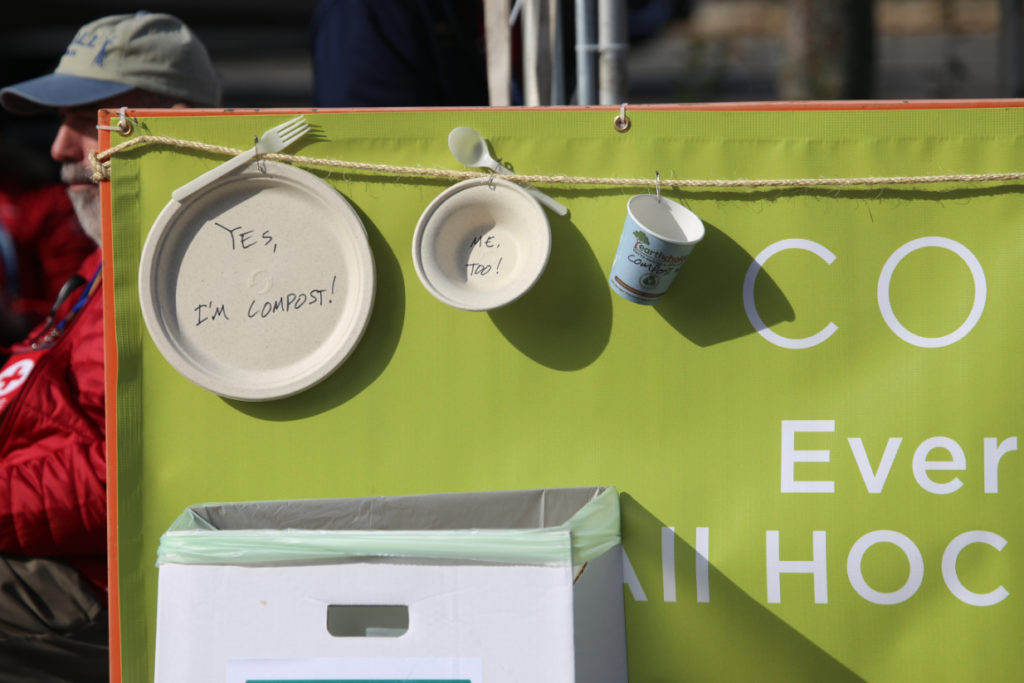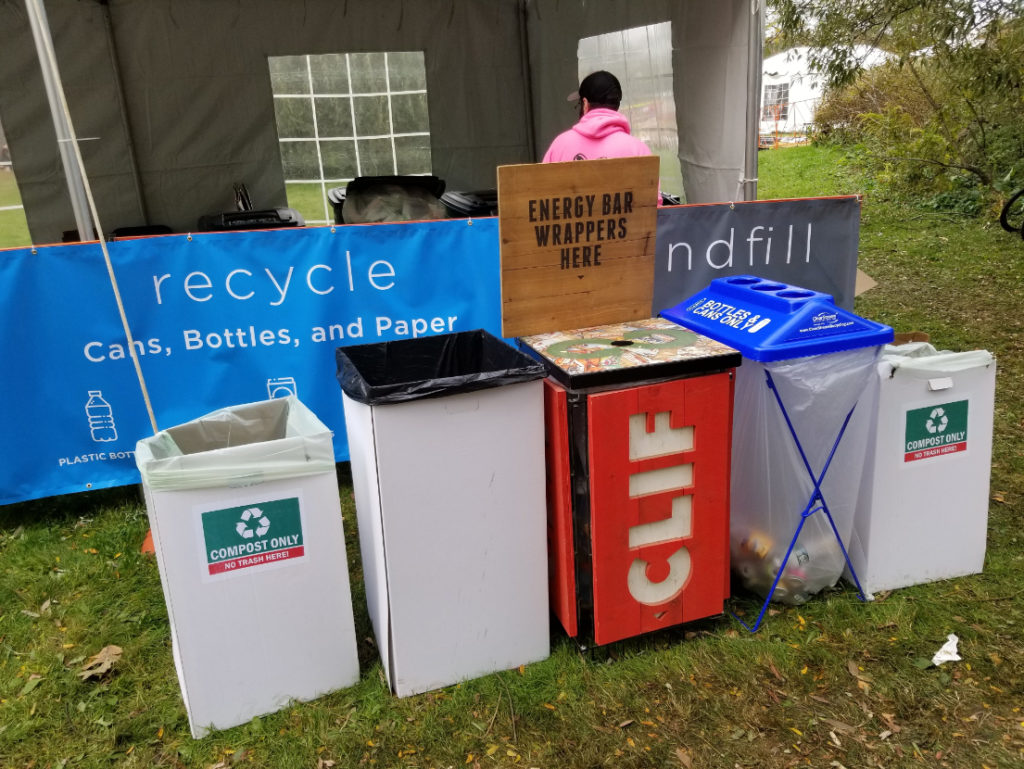
Sustainability Volunteer
HOCR will be providing collection containers for food waste and compostable packaging, in addition to recycling and trash.
All registered food vendors will be selling their products in compostable packaging. HOCR Sustainability Volunteers are essential to reducing the waste generated by the Regatta. Volunteers will be assigned to an area and will monitor the bins in the area. If bins are monitored regularly there will be fewer problems with contamination. Spectators and athletes will find it helpful to have someone to speak with and to clarify what items go where. Remember, athletes come to row and spectators come to have fun and cheer on their friends and family, not to have to figure out how to sort their food scraps and service ware 🙂
Job Assignments
See Assignments here , each tab is a separate day. Please also review the Full List tab, to ensure you see each shift you are assigned.
Scroll down to read more about what you will be doing and to see a Training Guide.
Primary Duties
As a Sustainability Volunteer, your duties include:
- Preparing regatta site with Waste Sorting Stations
- Collaborating with vendors to distribute compostable food packaging
- Monitoring Waste Sorting Stations to prevent overflow or litter.
- Managing proper disposal of compostables and recyclables
- Breakdown of Waste Sorting Stations upon the finish of the Regatta

Weekend Duties, by day
- Working with vendors during event set up
- Setting up Waste Sorting Stations
- Prep for the weekend activities
- Working with vendors during event set up
- Setting up stations outside of Tents (Attager Row and Cambridge Boat Club (CBC))
- Monitoring the stations to ensure that event attendees separate materials properly.
- “Talking compost” with attendees. Station monitors should take the opportunity to speak about composting with event attendees and show them how to separate wastes for composting and recycling.
- Keeping the bin station area clean and neat and monitoring bins to ensure that they do not overflow. Make sure signage remains in place.
- Emptying full bags of compostables. Periodically check containers to ensure that they do not get too heavy to lift or move.
- Dealing with contamination: if a compost container becomes contaminated, station monitors should carefully remove the unwanted items as quickly as possible to discourage attendees from placing more trash in the containers. If the compost container is completely contaminated with trash, the contents should be put into a trash receptacle.
- Setting up stations outside of Tents (Attager Row, Cambridge Boat Club (CBC), and Weld Exhibition)
- Monitoring the stations to ensure that event attendees separate materials properly.
- “Talking compost” with attendees. Station monitors should take the opportunity to speak about composting with event attendees and show them how to separate wastes for composting and recycling.
- Keeping the bin station area clean and neat and monitoring bins to ensure that they do not overflow. Make sure signage remains in place.
- Emptying full bags of compostables. Periodically check containers to ensure that they do not get too heavy to lift or move.
- Dealing with contamination: if a compost container becomes contaminated, station monitors should carefully remove the unwanted items as quickly as possible to discourage attendees from placing more trash in the containers. If the compost container is completely contaminated with trash, the contents should be put into a trash receptacle.
Where will you be assigned? Check out the Assignments here!
Waste Sorting Stations
There will be 1 to 2 tents per zone, plus “trios” (trash/recycling/compost containers) scattered throughout the area, which volunteers will monitor. Massachusetts Department of Conservation and Recreation (DCR) will be managing the trash and recycling containers.
We will also be staging empty 64-gallon carts in the tents. These carts will hold full bags of compostables. Once the carts are full, we will call for the compost hauler to pick up.

Sustainability Volunteer Training Guide
Set-up: Work with the Massachusetts Department of Conservation and Recreations (DCR) to make sure all stations are in place—trash, recycling and compost containers; containers are lined with bags; signs in place. DCR manages and provides the trash and recycling collection. Sustainability volunteers manage compost collection, HOCR provides the composting containers.
The Service Area (Waste Sorting Stations/Tents)
- Review the logistics for the event: the materials being collected for composting, the locations of collection containers, assigned station(s), and how to sort materials.
- It is important that the recyclables and compostables do not get contaminated with trash.
- All vendors should be using only compostable and recyclable packaging, service ware, and utensils.
- Practice safety. Gloves should be worn at all times when handling recyclables and compostables. Do not stick hands inside a container to press down on the recyclables or compostables. Carefully remove trash from collection containers. Lift using legs, not back and do not lift more weight than is easy.
- Wasps may be attracted to the composting and recycling containers. Volunteers need to always look for stinging insects before putting their hands inside a collection container or picking up a full container.
Managing the Recycling and Composting Stations
- Take the opportunity to talk about composting and recycling with event attendees:
- Recyclables—cans, bottles, aluminum foil (clean), paper & cardboard.
- Compostables—food, soiled paper, compostable plastics (utensils, cups, etc.). The service ware and utensils are all compostable, they are made from corn starch, potato starch, or bamboo.
- Monitor the Stations. Keep them clean and neat. Make sure signage is in place.
- If trash is in any of the containers, carefully remove it (using litter pick-up sticks or gloves) in order to discourage attendees from placing more trash in the containers.
- Transport full bags of compostables to the Service Area. Place full bags of compostables into the carts in the Service Area Tent.
- Contact DCR if trash/recycling containers are full
- When the compost carts in the Tents get full, call a Sustainability Committee Chair on the radio to arrange for Black Earth to empty the carts. Call when you still have one empty cart.
- Do not let the bags get too full that they overflow or get too heavy to move. After lunch, bags may start to get full so monitor closely.
Event Clean Up – at the end of each day
- Pick up any litter
- Empty bags of compost into the carts in the Service Area Tent
- Organize supplies in Tent so they are ready to go for next shift
- Leave aprons and vests for the next shift
- Check vendor area for compostables
Other Notes
Work with your team to coordinate coverage, along with lunch breaks in your Area/Zone. Each Waste Sorting Area has a slightly different footprint. It is important that the trios near the food vendors are not left unattended. All trios must be monitored regularly to prevent contamination. A Sustainability Committee Chair will show you the footprint for your Area.